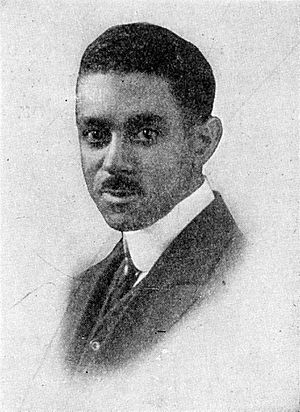Walter Everette Hawkins facts for kids
Quick facts for kids
Walter Everette Hawkins
|
|
|---|---|
 |
|
| Born | 17 November 1883 |
| Died | Unknown |
| Alma mater | Kittrell College |
| Occupation | Poet, mail clerk |
Walter Everette Hawkins (born November 17, 1883, his death date is unknown) was an American poet and a mail clerk. He was also known as a "freethinker," meaning he liked to question things and form his own ideas. Many people see him as an important writer who helped change Black literature from older styles to the more powerful and active writing seen during the Harlem Renaissance.
His Life Story
Walter Everette Hawkins was born on November 17, 1883, in North Carolina. He was the thirteenth child of parents who had once been enslaved. One of his older brothers, John R. Hawkins, worked for the railway mail service. Later, John became a teacher and even the president of Kittrell College.
Walter went to school in Warrenton. He graduated from Kittrell College in 1901. After finishing college, he moved from North Carolina to Washington, D.C.. There, he worked as a mail clerk for the post office. In his free time, he wrote poetry. He once said that his only fun was "stealing away to be with the masters, the intellectual dynamos, of the world." This meant he loved to read and learn from great thinkers.
His first book of poems was called Chords and Discords. It was first published in 1909 and then a new version came out in 1920. Later, in 1936, when he was living in Brooklyn, New York, he published another book of poems called Petals from the Poppies.
What He Believed
Walter Everette Hawkins wrote poems that often fit the style of Black writing from his time. However, he also wrote about new and bold ideas. He was very open and direct, especially when he wrote about religion and people who acted like hypocrites (saying one thing but doing another). This directness showed a strong spirit that made him more than just a traditional poet.
Hawkins was very clear about his dislike for certain religious ideas. He also spoke out against people who claimed to be religious but were unfair to others because of their race. In a poem called 'Credo', he wrote:
I am an Agnostic.
I accept nothing without questioning. It is my inherent right and duty To ask the reason why. To accept without a reason Is to debase one’s humanity And destroy the fundamental process
In the ascertainment of Truth.
This means he believed it was important to question everything and not just accept ideas without thinking about them. He felt that asking "why" was a key part of being human and finding the truth.
He believed that fighting for fairness and justice for Black people was a very important part of being a Black poet. Hawkins looked up to W. E. B. Du Bois, a famous leader and writer. He was interested in celebrating the unique history and culture of African Americans.
Walter Everette Hawkins was a member of the Negro Society for Historical Research. He also had his poems published in important magazines like the African Times and Orient Review and The Crisis. For a short time, he was also connected to The Messenger magazine.
In his 1936 book Petals from the Poppies, he wrote that art, especially poetry, should help fight for "universal justice, freedom and peace." He believed poetry should stand against "evil, oppression and cruelty."
 | Stephanie Wilson |
 | Charles Bolden |
 | Ronald McNair |
 | Frederick D. Gregory |

